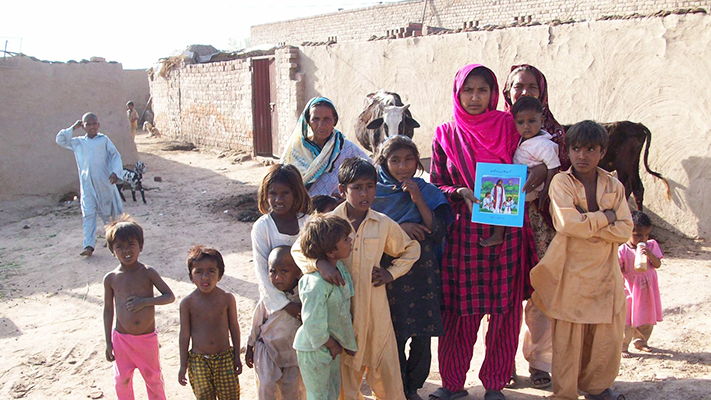 |
A friendly counselor shares what the message of the Reformation means to him and to those he serves in South Asia.
As soon as they opened the door of my plane, I could tell the air was different and that I was in a place I had never been. At one in the morning it was as warm and as humid as the hottest day of the summer back home. Hundreds of people—awake in the middle of the night—begged to carry my suitcases to a taxi. On the darkened streets I saw people sleeping on the sidewalks with their heads only a couple feet from the wheels of our car. Cows rummaged through garbage. At 3 in the morning in my hotel room I wondered, What am I doing here?
I could not drink the water. I had to close my eyes when I took a shower. The food tasted different. The lights worked only some of the time. The toilets were . . . well, that’s another story. Yes, what am I doing here?
Everything was different, except for one thing: “Sola gratia, sola fide, sola Scriptura.” “Grace alone, faith alone, Scripture alone.” These are the great truths of the Reformation. I saw them for the first time in my life on the cornerstone of our seminary in Mequon, Wisconsin, as I prepared to change my field of study from a doctor to a pastor. As I looked at those words, I thought, This is something I can dedicate my life to.
From that time on, I appreciated those words. But they came to mean more to me during my years of service in foreign lands. I serve two countries in South Asia—one is a Hindu nation, and the other a Muslim nation. The circumstances of these two countries are infinitely different from the world in which Luther lived more than 500 years ago. But the message of “grace alone, faith alone, Scripture alone” is the one thing the people of these countries need most of all.
God’s truth for all nations
Hinduism believes in reincarnation. According to Hinduism you must be reincarnated 8.4 million times before you can escape the cycle of life. You return to earth because you have not suffered enough for your sins in your past life.
How different—how comforting—is the message of the Lutheran Reformation! Only Jesus’ suffering will pay for your sins. He took the full punishment for your sins when he died on the cross. “There is now no condemnation [punishment] for those who are in Christ Jesus” (Romans 8:1). Not 8.4 million lives, but one life—the life of Jesus—will give you peace with God.
In Islam there is no certainty of salvation—unless one is a martyr for jihad. Young Muslims are sometimes told, “Abraham gave up what was most dear to him, his only son. If you truly love God, you will give up what is most dear to you.” When they explain what is most dear to them—a family member or their own life—they sometimes will be asked to sacrifice that person. Some young men have gone home and killed their mothers in order to show their loyalty to Allah. Others will strap on a suicide vest and detonate it in a crowd of innocent people. By dying for their faith, they believe they will enter paradise where they will have 72 virgins.
Again, how different is the message of Christianity, the message of the Reformation! It is not our sacrifice that gives us peace with God. It is Christ’s sacrifice for us. He was sacrificed once for all to take away all our sins (Hebrews 9:28). In him we are made perfect (Hebrews 10:14).
A Hindu Brahmin told me how a traditional wedding ceremony begins in the evening and then goes through the night and into the next day. When I asked him why, he said, “We want to invoke as many gods as possible to provide protection for the young couple.” Hinduism believes in 300 million gods (or in 1 god who manifests himself in 300 million ways).
The Lutheran Reformation shows that we do not gain God’s favor even by speaking endless words in prayer. God’s favor is a gift of his undeserved love. Jesus said, “When you pray, do not keep on babbling like pagans, for they think they will be heard because of their many words. Do not be like them, for your Father knows what you need before you ask him” (Matthew 6:7,8).
Hinduism believes in karma, which most define as “good for good and bad for bad.” Do good, get good. Do bad, get bad. In South Asia those who are rich are sometimes told, “You were good in your past life, so you are being rewarded.” If you are poor—and the Hindu nation I serve is filled with people who are indescribably poor—you are told, “You were wicked in your past life. You deserve to suffer.” Karma is completely work-righteousness.
Now think of the message of the Reformation. God does not give us what we deserve. He gives us what we do not deserve—the gift of salvation in his Son. Whether you are rich or poor, high caste or low caste, male or female, through faith in Jesus you are God’s dear child. And when you die, you will not come back to this world with its suffering, you will be with God in glory.
The name of God in Islam is “Allah,” which means master. The name “Muslim” means “one who submits,” that is, a servant or a slave. The relationship between God and the sinner in Islam is that of a master and a servant or slave. Some teachers of Islam claim it is blasphemous for a Muslim to claim to have a personal relationship with Allah. Allah is too great, too holy, too distant, for a sinner to have a personal relationship with him.
In Christianity we are not simply servants; we are God’s dearly loved children. We dare to call him Father, yea, we are invited to call him Father (Romans 8:15).
Sharing God’s truth
In seminary classes in these countries we teach the Lutheran Confessions. At first it might seem that this will be dull and have little or nothing to do with the world of Hinduism or Islam. But the students often remark how the teachings of the Roman Catholic Church in Luther’s day are surprisingly similar to some of the teachings of Hinduism and Islam today. The Lutheran Reformation restored the truth of God’s Word. The Confessions give maximum comfort to the sinner and maximum glory to God. The people in South Asia hunger for these truths. They will travel for days by foot and by bus to attend a seminar where they will sit on the floor from 8 a.m. until 4:30 p.m. to learn the truths of the Reformation.
“What am I doing here?” They know the answer, and I do too: To know his love and to make his love known so that others will be brought out of darkness into his wonderful light. Even with the threat of imprisonment or death, they happily proclaim these truths: “Grace alone, faith alone, Scripture alone.”
Author: The author’s name is withheld to protect him and his work of sharing God’s truths.
Volume 106, Number 10
Issue: October 2019







